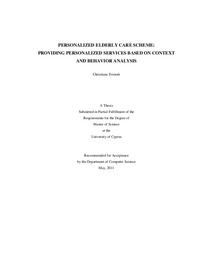| dc.contributor.advisor | Samaras, George | en |
| dc.contributor.author | Tsiourti, Christiana | en |
| dc.coverage.spatial | Cyprus | en |
| dc.creator | Tsiourti, Christiana | en |
| dc.date.accessioned | 2013-08-27T09:12:56Z | |
| dc.date.available | 2013-08-27T09:12:56Z | |
| dc.date.issued | 2011-05 | |
| dc.identifier.uri | https://gnosis.library.ucy.ac.cy/handle/7/13018 | en |
| dc.description | Thesis (Master) -- University of Cyprus, Faculty of Pure and Applied Sciences, Department of Computer Science, 2011. | en |
| dc.description.abstract | Elders who live alone generally have rich care networks—support networks of people who provide the elder with care. Such networks provide assistance ranging from day-to-day activities to social support and often include people of varying ages and skills, which have significantly different roles in the elder‘s care and may or may not be professional caregivers (family members, friends, neighbors, medical staff, etc.).
Clearly, the support network‘s major objective is to keep the elder physically healthy. However, it must also consider the person‘s mental and emotional states and overall well-being. In many circumstances, the network is dealing with a person who is slowly losing his or her independence [1]. Care requirements for elders change over time. Some are predictable, such as the well-understood progressions of diseases and conditions. Others are unpredictable, brought on by sudden changes such as a fall or variations in emotional status [1].
Perhaps the greatest challenge for providing effective elderly care is for the Care Network to immediately identify such events that occur in the user context and adapt to the individual features and user behavior patterns.
This work focuses on using technology to aid the elder himself as well as his entire support network. It addresses the creation of a Personalized Care Scheme that meets the individual and altering needs and preferences of the elder to provide targeted, efficient and effective care services.
The scheme is based on a pervasive platform that persistently records information from the user‘s context in a mobile environment and analyzes the activities of the elderly with the objective of detecting emergency situations, trends and deviations from what might be considered normal behavior. The identification of sublet changes in the social and physical activity can signal to the caregivers' trends indicative of psychological deterioration or progression of a health condition. Special attention is paid to personal preferences and needs of the users kept in personalized profiles updated dynamically based on information learned by observing the user‘s interaction with the system. Personalization algorithms ensure that information stored in profiles is reflected in the content provided to the services. The profiles are managed directly, without the need of a centralized server, through a personal mobile device which users carry.
The technology-supported Personalized Care Scheme is highly user-centered and context-aware. Smart devices with pervasive sensors and personalized databases together with care takers improve the quality of life of the elderly by facilitating social interactions, reducing limitations imposed by physical and mental conditions, location and time, and increasing personal control. | en |
| dc.format.extent | x, 156p. ; 30 cm. | en |
| dc.language.iso | eng | en |
| dc.publisher | Πανεπιστήμιο Κύπρου, Σχολή Θετικών και Εφαρμοσμένων Επιστημών / University of Cyprus, Faculty of Pure and Applied Sciences | |
| dc.rights | info:eu-repo/semantics/openAccess | en |
| dc.source.uri | https://ktree.cs.ucy.ac.cy/action.php?kt_path_info=ktcore.actions.document.view&fDocumentId=12927 | en |
| dc.title | Personalized elderly care scheme: providing personalized services based on context and behavior analysis | en |
| dc.type | info:eu-repo/semantics/masterThesis | en |
| dc.contributor.committeemember | Samaras, George | en |
| dc.contributor.committeemember | Pattichis, Constantinos | en |
| dc.contributor.committeemember | Vassiliou, Vasos | en |
| dc.contributor.department | Τμήμα Πληροφορικής / Department of Computer Science | |
| dc.author.faculty | Σχολή Θετικών και Εφαρμοσμένων Επιστημών / Faculty of Pure and Applied Sciences | |
| dc.author.department | Τμήμα Πληροφορικής / Department of Computer Science | |
| dc.type.uhtype | Master Thesis | en |

